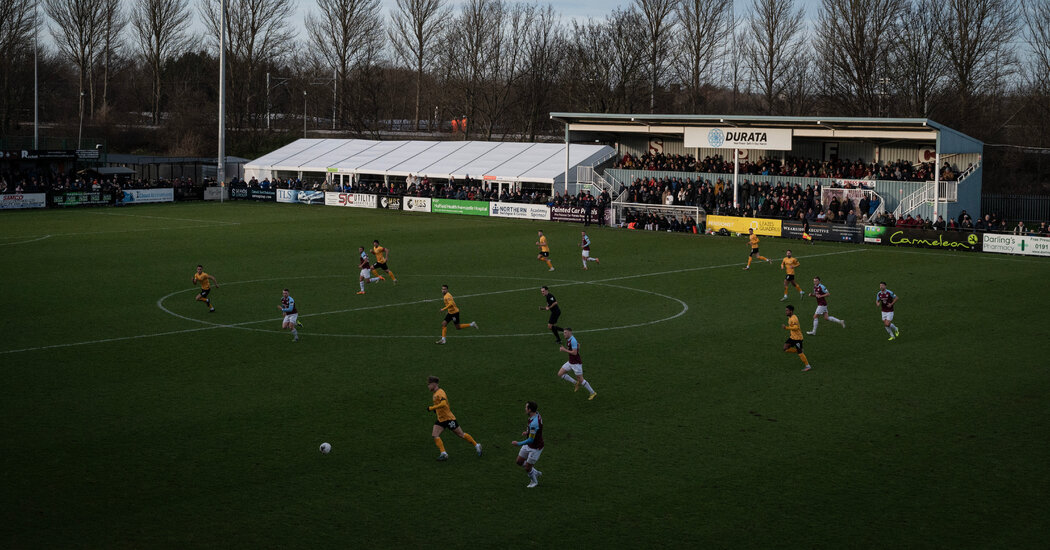Geoff Thompson knows there are plenty of people who want to buy what he has to sell. The phone calls and emails over the last few weeks have left no doubt. And really, that is no surprise. Few industries are quite as appealing or as prestigious as English soccer, and Mr. Thompson has a piece of it.
It is, admittedly, a comparatively small piece: South Shields F.C., the team he has owned for almost a decade, operates in English soccer’s sixth tier, several levels below, and a number of worlds away, from the dazzling light and international allure of the Premier League. But while his team might be small, Mr. Thompson is of the view that it is, at least, as perfectly formed as any minor-league English soccer club could hope to be.
South Shields has earned four promotions to higher leagues in his nine years as chairman. The team owns its stadium. Mr. Thompson has spent considerable sums of money modernizing the bathrooms, the club shop and the private boxes. There is a thriving youth academy and an active charitable foundation. “We have done most of the hard yards,” Mr. Thompson said.
After a cancer scare last year led him to reassess his priorities, Mr. Thompson has, reluctantly, decided that he has to “hand the baton” to someone else.
That is where things becomes complicated. There are plenty of very wealthy people who want to buy their way into English soccer. It is, as Mr. Thompson said, “fun.” Owning a team offers the chance to “be a hero” to a place. It is a pitch sufficiently compelling that, in a matter of weeks, at least four suitors — two British, two American — have inquired about taking South Shields off his hands.
That is the upside. The downside is that — as the Premier League has become a playground for private equity firms and sovereign wealth funds, and as the “Welcome to Wrexham” success has focused Hollywood’s searchlight on the romance of the game’s backwaters — England’s minor leagues have become a place where even the very rich can feel poor.
The league to which South Shields has risen, the National League North, is largely stocked with part-time teams and semiprofessional players, but the team’s salary bill still stands at around $1.2 million a year. (Even that is not the highest in the division.) Mr. Thompson estimates he has invested around $10 million of his own money in the club. He knows he will not recoup most of that.
And that, he says, is fine. He is happy to have created something to treasure in South Shields, his modest hometown, a place, he said, that is “always in the wrong quartile for obesity, for poverty, for unemployment.”
“I feel all right about it,” he said. “Even if they sound like the words of a madman.”
The challenge is finding a person to succeed him who feels the same way. He does not want all of his work to disappear when his successor realizes that the money will not go quite as far as one might hope. “I don’t want it to wither on the vine,” he said.
Chasing the Dream
Simon Leslie does not know how or when his ambition to own a soccer team came about. It was just something he knew, and had known, for some time. “I always wanted to own a club,” he said. “I thought it looked like the coolest, sexiest job in the world.”
Before the advent of the Premier League three decades ago, Mr. Leslie’s background — he founded Ink, a company that produces a portfolio of in-flight magazines, and sold his stake in 2022 — would have made him a likely candidate to own a team in the upper reaches of English soccer.
Now, though, the cost of entry into the top flight is essentially out of reach for the merely extraordinarily wealthy: Jim Ratcliffe, one of the world’s richest men, recently spent well over $1 billion to buy just a 25 percent stake in Manchester United. Rising prices have caused an inflationary spike farther down, meaning that even buying into the second tier league, known as the Championship, is prohibitively expensive.
“You need nation-state money to buy a Premier League team,” as Mr. Thompson put it. “A team in the Championship needs hundreds of millions.”
Last year, Mr. Leslie realized his dream in the sixth tier instead, taking a majority stake in Eastbourne Borough, a mainstay of the National League South, the geographical counterweight to the division South Shields calls home. In the town of Eastbourne — genteel, coastal, artsy — Mr. Leslie saw opportunity.
He had a bold vision for what its soccer team could become: a haven for players released by elite academies, and sustained by a state-of-the-art rehabilitation center — “cryotherapy, cold plasma, everything,” he said — sandwiched between the sea and the rolling hills of the South Downs.
It would be wrong to say that money was no object, but Mr. Leslie was prepared to invest. He has spent around $600,000 in his first season, hiring not only players but also sports scientists, talent spotters and chefs. He expects to invest the same amount in his second year. The aim is to break even by 2026 since there is, Mr. Leslie said, a “limit to how much I am prepared to lose.”
But the inflationary effect that has priced even the superwealthy out of top-tier soccer is now being felt throughout the various strata of English soccer: Across the country, there are dozens of investors pouring vast sums into teams in the three divisions of the semiprofessional National League and even into the sprawling, hyperlocal amateur tiers below that.
“It’s not just that teams from the divisions above come to sign our players,” Mr. Leslie said. “We’ve had clubs from the Isthmian League, the level below, offering players more money than we pay them.”
They can do so because — unlike the Premier League or the three professional tiers of the Football League just below it — England’s minor leagues have no cost controls. Owners can spend what they like, and they are incentivized to do so because of the potential reward: Promotion to the Football League can mean about $1.2 million a year in broadcasting revenue alone.
“It’s in the National League that people think they can make money,” Mr. Leslie said.
Over the course of his first few months at Eastbourne, he has come to realize that is much easier said than done.
A Losing Gamble
English soccer has an unfortunate habit of viewing its beloved pyramid only from the top down. As it descends from the cash-soaked Premier League through the ambitious Championship to the dozens of semiprofessional and amateur leagues below that, the depth and breadth of the league system seem to illustrate not only the sport’s popularity but also its health.
Observe the pyramid from the bottom up, though, and the impression is different. It is steep, and daunting, and quickly narrowing.
Only two National League clubs can be promoted each season into the Football League, unlocking its coveted television income.
“Clubs spend an inordinate amount of money to get out” of the lower leagues, said Christina Philippou, a lecturer in sports finance at the University of Portsmouth. “That means if others want to compete, they have to spend similar.” And that, she said, “creates a spiral.”
It is one drastic enough that it surprises even those who might have grown accustomed to it. “I see some of the teams spending money, and I’m flabbergasted,” said Gary Douglas, the chairman of Guiseley, a National League North team in a suburb of Leeds. “There are teams with fairly small crowds who suddenly have these huge budgets.”
The change, he said, has been gradual. He first invested in soccer in 2006, joining with two friends to take control of Guiseley. Their combined wealth made the club the “richest in nonleague,” as Steve Parkin, one of the members of Mr. Douglas’s triumvirate, said at the time of the purchase.
That is most certainly not the case anymore. Money has poured into the minor leagues in recent years, even before Wrexham — both the team and the documentary — brought an unanticipated allure to the lower reaches of English soccer. Now there are dozens of wealthy owners prepared to gamble that they will be the ones who succeed.
“The National League is the golden goose,” Mr. Douglas said.
Quite how risky an investment it is, though, can be seen in the clubs’ finances. In 2022, the last year for which a full set of figures is available, clubs in the three divisions of the National League reported a combined loss of $25 million. Two-thirds of the league’s teams were effectively insolvent, their liabilities dwarfing their assets. That pattern is most likely repeated even further down the pyramid where revenues are even smaller.
“It’s got disaster written all over it,” Dr. Philippou said.
For some, deliverance will come with escape, and promotion. But far more teams — and their owners — are destined to be disappointed. Like Mr. Douglas, the Guiseley chairman, they might find themselves committed financially and emotionally, unable to leave.
“Once you’re in, you’re in,” he said.
Or they might, like Mr. Thompson, the South Shields chairman, have to start the long, exacting search for a suitable replacement: someone who will build on, rather than dismantle, their work. That, after all, is kind of how the system works.
“The model is that, for reasons of ego or for emotion, there are always new people waiting when one particular individual’s journey at a club ends,” Dr. Philippou said.
It only works, though, she added, because of the belief that “there will always be someone else who comes along.”

